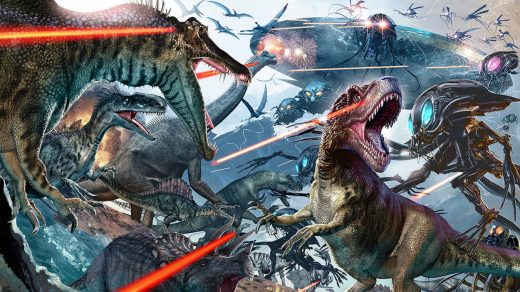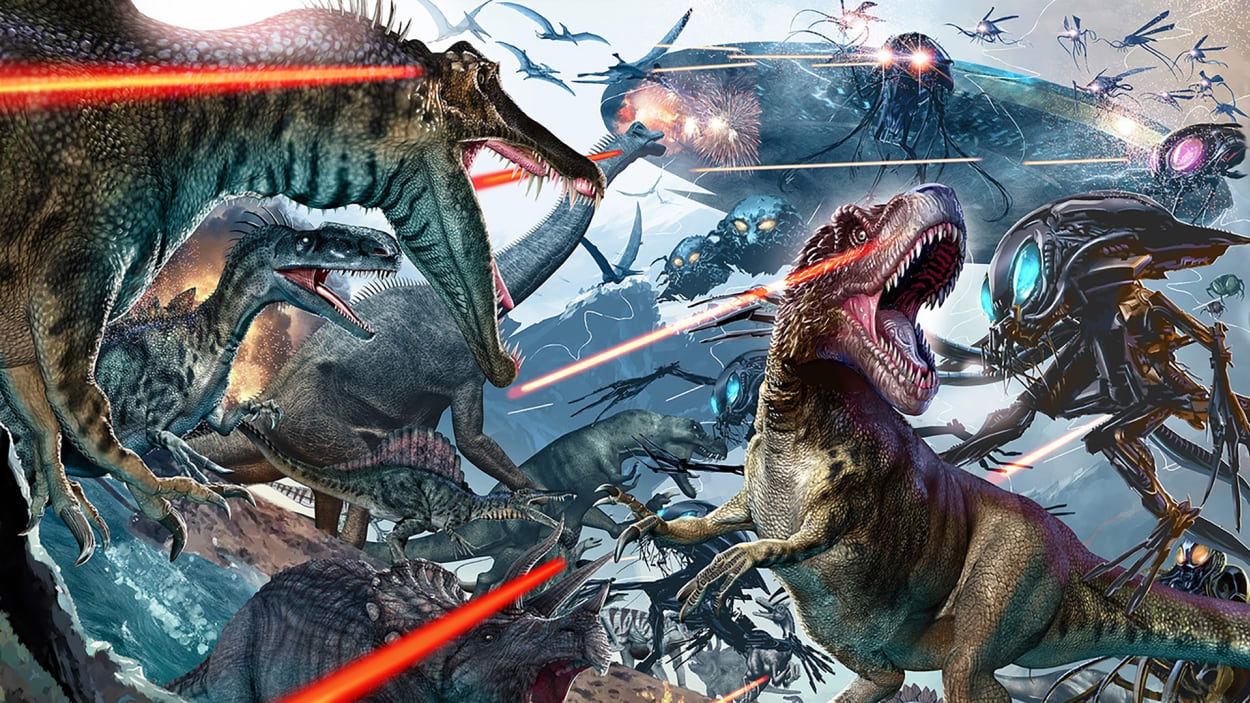Hollywood is developing its most ambitious NFT project yet during crypto winter
Dinosaurs vs. Aliens is an epic battle that’s been fossilized in Hollywood purgatory for a decade.
Based on the 2012 graphic novel by Men in Black director Barry Sonnenfeld and storied comic book writer Grant Morrison, Dinosaurs vs. Aliens regales an alien invasion during prehistoric times and the ensuing war for Earth. It had all the makings of a theatrical release: a splashy premise, a built-in audience from the graphic novel, and a noted director and cinematographer in Sonnenfeld attached. It was certainly meant to become a film, except the project never got out of the development phase.
“But I’ve always loved the idea,” Sonnenfeld says.
Last year, Sharad Devarajan, cofounder of Liquid Comics (the publisher of Dinosaurs vs. Aliens) came to Sonnenfeld with an idea of resurrecting Dinosaurs vs. Aliens as a film—by way of NFTs.
Devarajan had met with film and TV producer Dave Broome who was heading up his new company Orange Comet, a creative studio making NFTs as entertainment. Instead of a static image or GIF, many of Orange Comet’s NFTs are cinematic-quality CGI clips often pegged to a larger story or idea.
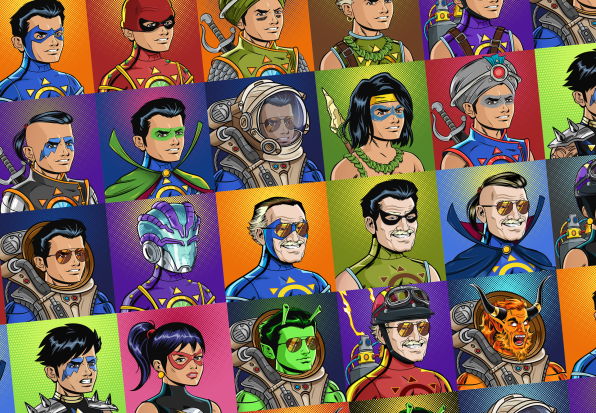
[Image: Orange Comet]
Orange Comet created several NFT drops for AMC’s The Walking Dead, Stan Lee’s Indian superhero Chakra, NHL teams Seattle Kraken and New York Islanders, the NFL Alumni Association, and more. Orange Comet has also secured deals with major Hollywood studios and streamers to produce NFTs around various properties.
But Broome’s bigger vision for Orange Comet is creating or acquiring original intellectual property (IP) as NFTs, developing that IP with the community of NFT holders and then turning the project into a film or TV show. One of the company’s earliest test cases will be Dinosaurs vs. Aliens with its first NFT drop slated for November.

[Photo: Sasha Erwitt]
“I love the idea of creating these various NFTs, because it gives me a chance to remake this as a new IP,” Sonnenfeld says. “Second of all, I just would love to learn about the future. I’m so old and white.”
Owners of projects including Bored Ape Yacht Club and DeadHeads are already flipping their NFTs into various entertainment properties. Where Broome sees a distinct lane for Orange Comet is upping the storytelling out of the gate with NFTs that are basically like mini trailers.
“It’s giving the fans something that feels like a truly bespoke collectible that tells a little bit of a story in that NFT rather than just looking at some ape that’s either bored, hungry, tired, angry, whatever the hell it is,” says Broome, cofounder and CEO of Orange Comet.
Orange Comet’s goal is to take the general market of entertainment and bring those properties into Web3 by focusing on story-driven NFTs. If done correctly, Orange Comet could become a viable force in Hollywood as a go-to studio for building IP in the NFT space—that is, if there remains a space to build in.
“Shouldn’t best creative win?”
Nearly two years ago, Broome got a call from his friend Will Meris, managing director of asset management firm Caliber Companies, who told him he was interested in starting an NFT company and he wanted Broome to run it.
As a Hollywood veteran, most notably creating The Biggest Loser and The Ultimate Beastmaster and producing Jennifer Lopez’s Netflix documentary Halftime, Broome wasn’t immediately thrilled at the prospect of making a pivot.
“I hung up that phone thinking, ‘I’m not gonna give this any thought,’” Broome says. “What the fuck is an NFT that I’m gonna give up a 25-year career?”
But as NFTs began dominating pop culture, something scratched at Broome—mainly that he was unimpressed with what he was seeing.
“To put it bluntly, it was shit,” Broome says. “It was almost like just regurgitating an asset. So, I started to get excited about this because isn’t this the game of entertainment? Shouldn’t best creative win?”

[Photo: Orange Comet]
Broome took Meris up on his offer and launched Orange Comet last April with the mandate that everything the company works on be story focused.
Orange Comet utilizes the 3D design studio within Broome’s production company, 25/7 Productions, to create the NFTs, and it currently has around 55 projects in the works within sports, film and TV, live events, and even real estate. While Orange Comet will continue to take on client work and special celebrity-driven projects, Broome is keen on growing the studio’s slate of original IP as NFTs, with a clear pipeline to Hollywood. In Broome’s mind, NFTs are no different as a medium for IP than what podcasts or social media memes and characters have become.
“We’re not sitting here going, let’s just come up with something cool looking,” Broome says. “We’re going, what’s the end game? Where do we want to go? And how do we reverse engineer that story?”
“It’s a whole different world”
Dinosaurs vs. Aliens will be Orange Comet’s first original project. While details are still mum, you can get a sense of what Orange Comet is aiming to accomplish with their strategy through its work with The Walking Dead.
In conjunction with the show’s series finale trilogy arc that began in August 2021 and will wrap up later this year, Orange Comet sold out 10,000 generative art pieces in its initial collection featuring The Walking Dead characters and original animations inspired by scenes from the show, all ranging in price from $50 to $250 and earning around $15 million. A second drop in April had 5,000 variations of Daryl Dixon’s (Norman Reedus) iconic motorbike. They sold out in seven minutes on OpenSea to the tune of $1.3 million. Orange Comet also created Walker Access Passes, one-of-one NFTs that will allow holders exclusive perks, including first dibs on future drops, qualifying for an in-person screening of the finale, and access to a Walking Dead virtual universe.
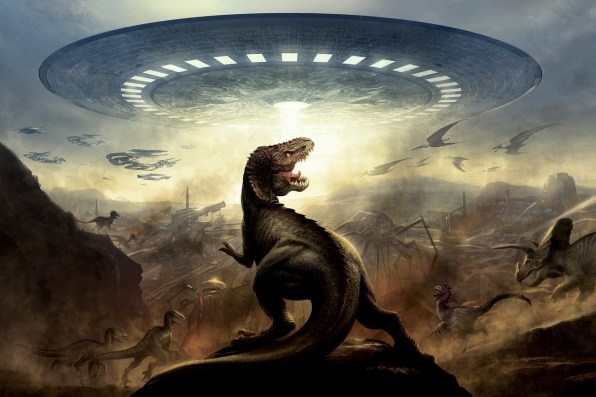
So in the case of Orange Comet’s original or acquired IP, all the NFT drops and subsequent metaverses would build up to what would become something like The Walking Dead—or the film version of Dinosaurs vs. Aliens.
“I’m all about world creation,” Sonnefeld says. “I can be creatively very involved in both the story and visuals without a traditional studio saying, can we have more closeups?”
Even though it was a well-reviewed graphic novel, Dinosaurs vs. Aliens stalled in development as a film adaptation mainly due to budgets. It’s long been the tale in Hollywood that studios are only willing to pony up for blockbuster tent poles if there’s a wide and rabid enough audience to support it.
“They want Fast & Furious. They want Mission Impossible. It’s tough to get studios to cut checks for a brand-new franchise,” Broome says. “I have to turn [Dinosaurs vs. Aliens] into a massive following in the world of NFTs. I gotta build a base of people and a huge global brand around it for Hollywood to take notice.”
To do that, Sonnenfeld and the Orange Comet team will work with NFT holders to build out the world of Dinosaurs vs. Aliens. One of the critiques of the graphic novel was that it was too short at just 96 pages. That may have been frustrating for early readers begging for more content, but it leaves a long runway for where to take the story next.

[Image: Orange Comet]
“We’re finally getting to a moment where I see a lot of convergence on how we think about what the future of storytelling, the future between creator and community,” says Sharad Devarajan, cofounder of Dinosaurs vs. Aliens‘s publisher Liquid Comics. “This isn’t a romantic comedy. This is a massive universe that Barry had created where there’s so much that we can unlock now.”
There are no firm details on what IP rights NFT holders will have, e.g., will they be able to use their NFTs in any commercial way? But Devarajan is clear on cultivating “creative alignment” with the community. Orange Comet wants to effectively bridge NFT enthusiasts who are just prowling around the for the next big project and existing fans of entertainment properties like Dinosaurs vs. Aliens. In the case of The Walking Dead‘s NFT drops with Orange Comet, 75% of the buyers had never seen an episode of the show and 25% have never bought an NFT before.
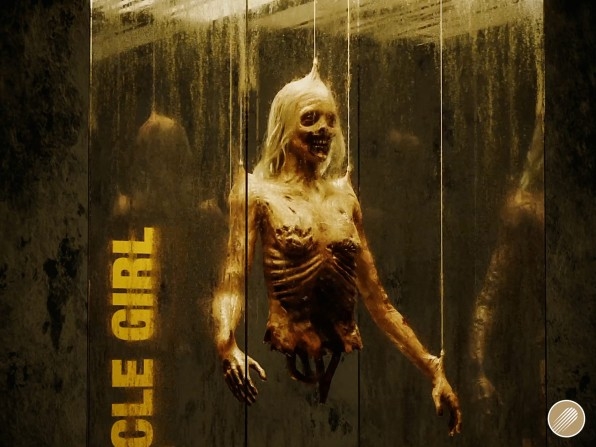
[Image: Orange Comet]
“This is all about a value proposition for both NFT buyers and fans,” Broome says. “Give them content that truly excites them and gets them engaged, and you’re off to the races in a massive way. Provide mediocre, run-of-the-mill work, like most projects in this space, and you are going to struggle.”
For Sonnefeld, developing mini clips of Dinosaurs vs. Aliens is also a low-cost outlet for experimentation for fleshing out the film version.
According to the director, the last shot of Men in Black where the camera zooms out to reveal that our entire galaxy is just a marble that aliens are playing with cost $750,000. That’s exactly the kind of enticing, story-building content Sonnefeld wants to create working with Orange Comet on Dinosaurs vs. Aliens. The difference now, of course, is that a shot like that will be at a fraction of the cost given how far 3D rendering has come since 1997.
“We can try things without being incredibly precious and concerned that you can’t do it because it’s too expensive,” he says. “It’s a whole different world.”
A different, if not perilous world, indeed.
“The best is yet to come”
It’s hard to talk about the prospects of any NFT project without acknowledging the current tailspin the space is in.
The recent crash in cryptocurrency has triggered a slowdown NFT sales. OpenSea, the world’s largest NFT marketplace, has seen sales plummet 75% since May. June was also on track to mark the first month since 2021 where NFT sales overall generated less than $1 billion. A silver lining is that it’s never been cheaper to get into the NFT game. However, one has to wonder if this downturn, alongside persistent inflation, could have a longer-term cooling effect for the fervor around NFTs.
Broome believes the current volatility in the market is “extremely healthy” for the long-term success of NFTs and Web3 because it “washes away the crap.”
“We’re in the middle of a 8.0 earthquake,” he says. “The weak structures that were never built properly collapse. What’s left standing are the ones that had a solid foundation.”
Broome notes that the downturn has affected Orange Comet in how they’re pricing their NFTs at lower cost and reducing the quantity of their drops. But he remains generally unfazed by the current state of the market. “This is a marathon for us, definitely not a sprint,” he says. “For many people in this space, they’ve taken the money and ran. But the truth is, the best is yet to come—just ask all of those who bailed in the early days of the dotcom era. This is history repeating itself. You don’t need to overthink it.”
Fast Company , Read Full Story
(29)

